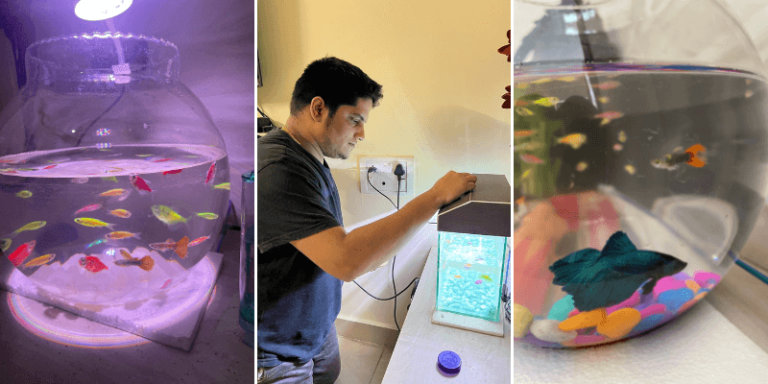How to take care of your aquarium fish when you are on a holiday
Are you going on a vacation soon or travelling for the holidays? How are you going to handle the fish while you’re away? Thankfully, there are a few simple ways to feed your fish when on holidays and vacations like: hiring a fish sitter; utilising commercial vacation feeders from your local fish store; or getting an automatic fish feeder, which may be used every day nevertheless.
Vacation feeders
Using vacation feeders is the easiest method of feeding. They come in sizes for 2 days (weekend), 7 days, and 14 days. There are two fundamental varieties: one has the food embedded in a calcium block, and the other has it in a gel. Every time, the block slowly submerges in the water and releases food particles for the fish to consume.
Feeder blocks have several benefits, including:
- Nourishes your fish for up to 14 days while you are away.
- Releases food sporadically as the block eventually dissolves and degrades slowly (although the calcium block will dissolve faster in soft, acid water than it will in hard, basic water)
- incorporates natural nutrients to satisfy the dietary needs of all tank fish.
- Use only in filtered or aerated aquariums; do not use in fish bowls. Water circulation is necessary to dissolve the block.
- Given that they don’t contain plaster and don’t cause water to get cloudy, gel blocks may perform better in specific water circumstances.
- Make sure there are enough bricks in the aquarium to accommodate all of the fish in it. However, it is preferable to underfeed the fish than to overfeed them during your absence. The aquarium water chemistry may be affected if the larger calcium blocks are used, particularly in soft water conditions. Although the gel feeders are less likely to alter the quality of the water, some claim that their fish won’t consume them.
Automatic feeders

Both battery-operated and electric plug-in variants of automatic feeders are available. They have timers that may be adjusted to administer the right amount of food a few times throughout the day. A specific quantity of food can be delivered with each feeding by adjusting the hole in the food-holding dispenser. These are excellent for use at any time, and if you have them before your trip, you may modify the timing and food quantity supplied to feed the fish properly each day. These work great for feeding your fish while you are away as long as the food dispenser is full before you leave and has enough food stored to distribute for the time you will be gone.
Fish sitter
You should have someone take care of your fish if you are taking a longer vacation or holiday (more than a week). The most crucial message to convey to your assistant is that they shouldn’t overfeed your fish. Extra food will contaminate the aquarium and could be fatal. Even when they are well fed, many fish may still “ask” for more food (angelfish are known for this), but this behaviour is undesirable. You should pre-measure each meal in a tiny container or plastic bag to prevent your home sitter from bringing you too much food.
Utilizing a cheap plastic pill dispenser with a section for each day of the week is a wise choice. Place the same quantity of food in one of the pill compartments as you did when you fed your fish the week before you left. By the end of the week, you will have everything ready for your assistant to feed the animal the following week. They only need to open the dispenser each day and pour the food from the section designated for that day into the aquarium. Even if you generally feed the fish twice daily, feeding them once a day while you are away will usually be plenty. Underfeeding is preferable to overfeeding!
Don’t feed your fish
The benefit of being near water is that fish don’t have to wait for you to give them a drink. Freshwater fish are quite capable of going several days without a meal in terms of nutrition. Adult fish in good health can go for one or two weeks without food. Young fish cannot go for lengthy periods of time without food because they lack the fat reserves of adult fish.
While you shouldn’t habitually skip feedings, your fish can go without food for a few days during a long weekend. Remember, though, that when going on vacation, food isn’t the only thing to think about. If you’re not home, you need to make sure your filter, water heater, and lighting are all properly maintained.
Get a timer
Normal maintenance calls for turning off aquarium lights at night and turning them back on in the morning. Buying a timer makes managing lighting simple. As long as it will switch the aquarium lights on and off once daily, there is no need to purchase a sophisticated or expensive one. Set a timer for the light and leave it on all the time. Your fish will then experience a predictable cycle of day and night, and your daily workload will be reduced.
Water temperature

The temperature of aquarium water should essentially never change. In the natural, fish are used to seasonal temperature changes that come gradually, but if the change is abrupt, the stress will make the fish more prone to illness. Make sure your aquarium heater is functioning if the holiday falls during a cold spell and avoid setting your home’s thermostat too low. Tropical fish do best in water that is between 74 and 78 degrees Fahrenheit and cannot survive in water that is below 65 degrees.
Your fish will be very comfortable while you are away if you set your air conditioning to turn on whenever the room temperature gets above 80 degrees during the summer. In the event of a heat wave, it is advisable to make plans for someone to come inside and check the fish if you do not have air conditioning.
Fish physical condition
The health of your fish is a further crucial issue. Make sure none of them looks to be sick just before you leave for your holiday or vacation. Before departing, check with a fish store or an aquatic veterinarian if you spot any anomalies. If not, you run the chance of returning home to a sick or dead fish aquarium.
Make sure your fish sitter has your contact information, including your cell phone number and the number for your pet store. Whether you have a fish sitter or not, going on excursions safely depends on how well you plan. Here is a helpful list of things to finish up before you depart:
- One week before you depart, clean the tank.
- The day before you depart, fill the aquarium all the way up with water.
- Make sure the water is at the right temperature by checking it.
- Make sure the filter is functioning properly by checking it.
- Make sure all the fish are in good health by closely inspecting them.
- Put food into a dispenser for your fish caretaker if you have one.
- Give your fish caretaker your phone number as well as the number of the neighbourhood pet store.




